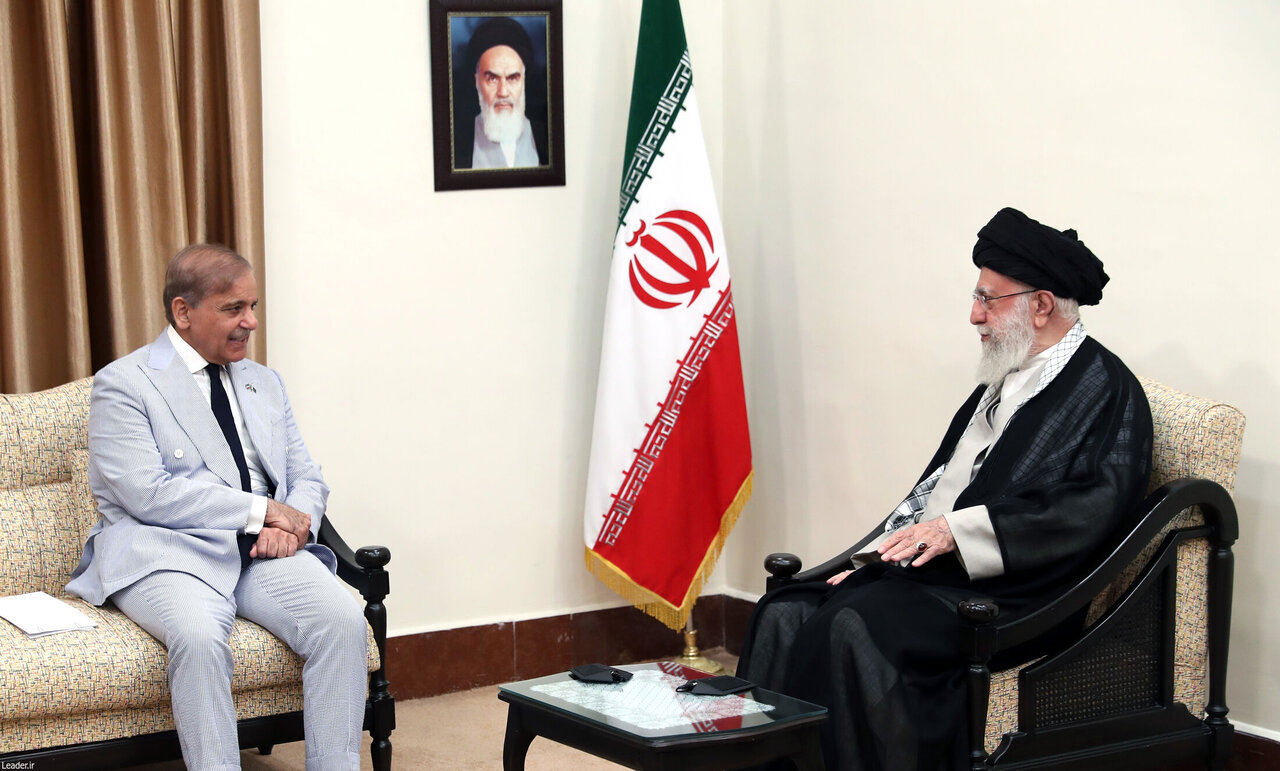Joint Iran-Pakistan efforts needed to halt Israeli crimes in Gaza: Leader

TEHRAN – The Leader of the Islamic Revolution, Ayatollah Seyyed Ali Khamenei, received Pakistani Prime Minister Shehbaz Sharif on Monday, engaging in a meeting that encompassed bilateral, regional, and international issues.
A great deal of the Leader’s remarks focused on the Palestinian cause and how Islamic countries must join hands to put an end to the plight of the Palestinian people. He particularly emphasized the “special status” of Pakistan within the Islamic world and the necessity for impactful joint activities between Iran and Pakistan to halt the crimes of the Zionist regime in Gaza.
Ayatollah Khamenei pointed out that Pakistan has not joined the train of countries normalizing ties with Israel in a blatant betrayal of the Palestinian cause, despite constant Western badgering. “While there have been temptations for Islamic countries to engage with the Zionist regime in recent years, Pakistan has never succumbed to these temptations.”
He described the Palestinian issue as the foremost concern of the Islamic world and noted the dire conditions in Gaza, stating: “The situation in Gaza has reached a point where ordinary people in Europe and the United States are protesting their governments, yet unfortunately, some Islamic governments stand alongside the Zionist regime under these circumstances.”
On the state of bilateral ties, Ayatollah Khamenei described them as having been “warm and brotherly” throughout the decades. Referring to Pakistan's “commendable stance” during the 1980s Iraqi invasion of Iran as an example of this brotherly relationship, he assessed the current cooperation between the two countries in various fields as below expected levels and added: “The two countries can assist each other in many areas, and we hope this visit will contribute to the comprehensive expansion of relations in various fields, especially economic, political, and cultural.”
Sharif, for his part, expressed great pleasure at meeting with the Leader. He appreciated the positive role of the Islamic Republic of Iran in alleviating the crisis that arose between Pakistan and India and referred to recent developments regarding recent clashes, while mentioning Gaza: “Unfortunately, the international community is not taking any effective action to end the tragedy in Gaza.”
The Prime Minister of Pakistan also expressed hope that his constructive negotiations in Tehran would pave the way for further strengthening relations between the two countries.
During another high-profile meeting, Sharif and President Masoud Pezeshkian pledged to expand economic, security, and cultural cooperation, while emphasizing the need for greater solidarity and connection among Muslim nations.
The discussions highlighted the deep historical and religious ties between the two neighbors, along with shared frustration over the lack of economic integration in the Islamic world. “Europe has managed to erase borders and build a unified market, yet we’re still struggling to establish basic trade and scientific partnerships,” Pezeshkian said. “This isn’t just a setback—it’s a failure we must urgently address.”
A major focus was boosting bilateral trade, which currently stands at a modest $2 billion, far below what analysts believe is its potential. Sharif argued that with stronger banking links and political commitment, that figure could jump to $10 billion. “Our shared history and resources demand closer collaboration,” he insisted. “We can’t allow outside forces to shape our future.”
For years, economic opportunities between Iran and Pakistan have gone untapped. Pakistan’s energy shortages could be eased by Iran’s vast natural gas reserves, while Iranian manufacturers see huge potential in Pakistan’s consumer market of 240 million people. Central to these plans is the long-stalled Iran-Pakistan gas pipeline, a $7 billion project delayed for over a decade due to U.S. sanctions.
Security was another key topic. Both nations face persistent threats from terrorist groups, prompting an agreement to ramp up intelligence-sharing and counterterrorism efforts.
The border between Iran’s Sistan-Baluchestan and Pakistan’s Balochistan is home to both a bustling cross-border market and a gathering of foreign-backed terrorists who target security forces and civilians on both sides.
“Terrorism is our common enemy,” Pezeshkian said. For his part, Sharif stated that Pakistan will never allow its soil to be used against Iran. “We are ready to have multifaceted cooperation with Iran in counterterrorism efforts,” he added.
